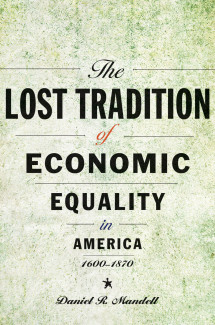
Johns Hopkins UniversityEst. 1876
America’s First Research University
The Lost Tradition of Economic Equality in America, 1600–1870

I began The Lost Tradition of Economic Equality in America, 1600–1870 while finishing my previous book, Tribe, Race, History, on Native Americans in southern New England from the Revolution through Reconstruction. At that time, 2005, the widening gulf between rich and poor in the U.S. was becoming a major public concern, decried in a growing number of policy studies and articles in national publications like the New York Times. As usual, few considered the history of the issue, and those that did at best went back to the Gilded Age for what the writers assumed was the origin of concerns over economic inequality. But I knew from that past research that during the Revolution and for decades afterward Americans worried about the corrupting influence of concentrated wealth and believed that widespread property ownership was essential to republican government. I had also learned that during Reconstruction, Congress had rejected land redistribution for freedmen while extending the vote, which seemed to mark a substantive ideological shift. I wanted to remind Americans of their Revolutionary ideals and wondered when, how, and why the shift had occurred, so I researched and wrote this book.
Probably my greatest surprise was finding that the American ideal of economic equality originated in seventeenth-century England. Ironically, this egalitarian ideology had its roots in the medieval assumption that all forms of power were connected, which for centuries had been used to justify autocratic authority. But that “godly hierarchy” was undermined by the Renaissance and challenged by a strain of Protestantism that insisted the unitary nature of God’s Creation made hierarchy sinful. Dutch and English Protestants also rediscovered the Jewish tradition of the Jubilee (Great Sabbath), held every half-century, when all debts were cancelled, all slaves freed, and all land returned to its original owners. The notion of complete equality exploded into prominence during England’s civil war in the 1640s, beginning with the London Levellers, who gained significant sway among Parliament’s New Model Army, and then in a more radical form by the “True Levellers” (Diggers), who set up communes and condemned private landholding as Original Sin.

The Diggers were quickly squashed and “Leveller” became an epithet, but their egalitarian vision survived. A more secular version grounded in Roman history entered England’s political discourse through James Harrington’s Commonwealth of Oceana (1656). In that famous and frequently-reprinted novel, Harrington envisioned a prosperous republic grounded on a constitution that gave land to all and placed an explicit limit on wealth. Three decades later, John Locke’s Two Treatises of Government argued (like the Levellers) that “all Men by Nature are equal” and government rested on a voluntary contract among men, and (like the Diggers) that labor rather than title gave value to land, so that those who worked the land had the best right to it. Both Harrington and Locke in turn shaped the ideas of the English radical Whigs in the 1720s, whose Cato’s Letters condemned the increasingly prominent role of wealth in British politics and called for various political and social reforms.
All of these sources would be hugely influential among literate Americans from the 1760s through the end of that century. From their beginnings the Anglo-American colonies had very high levels of land ownership and voting, made possible by death and displacement of many indigenous peoples, so ideas of economic and political equality seemed more aspirational than subversive. The efforts of Parliament to increase its authority in the colonies, beginning with the Stamp Act of 1765, increased the relevance and power of Cato’s Letters warnings to guard the virtuous egalitarian republic and beware of corrupting wealth. These self-reflective ideals became a tradition during the Revolution and early Republic, and continued to play a significant role in American culture and politics into the mid-nineteenth century. There were even occasional calls for a Great Jubilee. But after 1800 this tradition of economic equality was challenged by the rise of unstable wage labor, the widening gap between rich and poor, the concept that individual wealth and greed were good, and, with universal white male suffrage, severing the traditional link between property and polity.
My goal is for readers to gain not only a greater appreciation for the complex arguments that took place in the American past, but also many lessons about the present. When they engage in debates about the Citizens United decision or estate taxes, they will remember that Americans during the “Founding Era” were deeply concerned about the corrupting links between wealth and power. When they hear an official announce that the federal government is sending needed medical gear to private wholesalers for auction to states, they will remember that during the Revolution auctions were forbidden as generating artificial price increases and harm to the public good. Ultimately, I hope that my book will help Americans remember and renew this tradition of economic equality.
Order The Lost Tradition of Economic Equality in America, 1600–1870 – published on April 7, 2020 – at the following link: https://jhupbooks.press.jhu.edu/title/lost-tradition-economic-equality-america-1600%E2%80%931870
Daniel R. Mandell is a professor of history at Truman State University. He is the author of The Lost Tradition of Economic Equality in America, 1600–1870, Tribe, Race, History: Native Americans in Southern New England, 1780–1880, King Philip's War: Colonial Expansion, Native Resistance, and the End of Indian Sovereignty, and Behind the Frontier: Indians in Eighteenth-Century Eastern Massachusetts.



